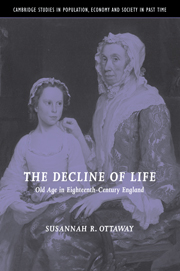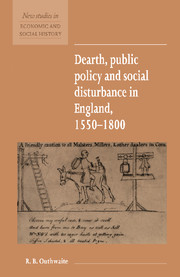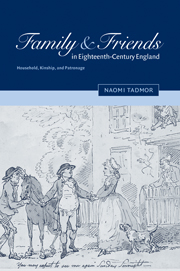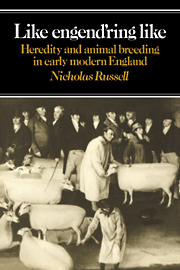
The Decline of Life
Old Age in Eighteenth-Century England
Part of Cambridge Studies in Population, Economy and Society in Past Time
- Author: Susannah R. Ottaway, Carleton College, Minnesota
- Date Published: July 2007
- availability: Available
- format: Paperback
- isbn: 9780521037921
Paperback
Other available formats:
Hardback, eBook
Looking for an inspection copy?
This title is not currently available on inspection
-
The Decline of Life is an ambitious and absorbing study of old age in eighteenth-century England. Drawing on a wealth of sources - literature, correspondence, poor house and workhouse documents and diaries - Susannah Ottaway considers a wide range of experiences and expectations of age in the period, and demonstrates that the central concern of ageing individuals was to continue to live as independently as possible into their last days. Ageing men and women stayed closely connected to their families and communities, in relationships characterized by mutual support and reciprocal obligations. Despite these aspects of continuity, however, older individuals' ability to maintain their autonomy, and the nature of the support available to them once they did fall into necessity declined significantly in the last decades of the century. As a result, old age was increasingly marginalized. Historical demographers, historical gerontologists, sociologists, social historians and women's historians will find this book essential reading.
Read more- An important contribution to family history, during a period when the nature of the family changed significantly
- Explicit focus on gender and class analysis throughout the book
- Draws on a wide range of sources to make important and innovative generalizations about the history of ageing
Reviews & endorsements
'Ottaway's book, however, does serve as a model for how to write a gendered social history … historians of demography, family, society, gender, and, of course, the eighteenth century, will find much in Ottaway's book to interest and instruct them.' H-Net
See more reviews'… an admirably detailed examination both of the experiences and of the expectations of the elderly in England during the eighteenth century … this should be required reading for the demographer and the social historian, but will be of interest to everyone with an historical bias.' Family History
'The Decline of Life is an important book that challenges what we thought we knew about old age in the past and affirms other, long held, traditional views, but most importantly it covers uncharted eighteenth-century ground and brings home the idea that one of the truest tests of any society is how it treats its dependent members, especially its old.' Local Population Studies
'… impressively thorough and readable … This book makes important contributions to historical scholarship in a number of ways. It also demonstrates how what could have been a narrow study of the distant past can stimulate thinking about the role of older people in all times and places.' Population Studies
'This is a thoughtful and thought-provoking book. … This important book deserves the attention of urban historians and hopefully will be the touchstone for detailed micro-studies of the elderly in eighteenth-century urban England.' Urban History
Customer reviews
Not yet reviewed
Be the first to review
Review was not posted due to profanity
×Product details
- Date Published: July 2007
- format: Paperback
- isbn: 9780521037921
- length: 340 pages
- dimensions: 229 x 153 x 19 mm
- weight: 0.513kg
- contains: 21 tables
- availability: Available
Table of Contents
List of figures
List of tables
Acknowledgements
List of abbreviations
Introduction: old age in eighteenth-century England: no 'golden age of ageing'
1. Who was 'old' in eighteenth-century England?
2. The activities of the 'helmsman': self-reliance, work and community expectations of the elderly
3. 'The comforts of a private fire-side'
4. Independent but not alone: family ties for the elderly
5. Community assistance to the aged under the Old Poor Law
6. Continuity and change in community assistance to the elderly over the eighteenth century
7. Within workhouse walls: indoor relief for the elderly
Conclusion: old age as a useful category of historical analysis
Bibliography
Index.
Sorry, this resource is locked
Please register or sign in to request access. If you are having problems accessing these resources please email [email protected]
Register Sign in» Proceed
You are now leaving the Cambridge University Press website. Your eBook purchase and download will be completed by our partner www.ebooks.com. Please see the permission section of the www.ebooks.com catalogue page for details of the print & copy limits on our eBooks.
Continue ×Are you sure you want to delete your account?
This cannot be undone.
Thank you for your feedback which will help us improve our service.
If you requested a response, we will make sure to get back to you shortly.
×




